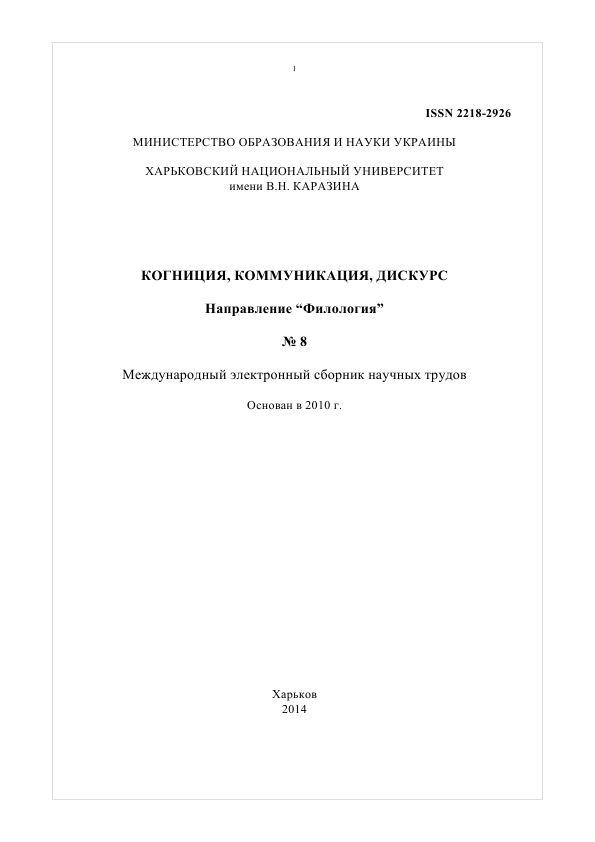Cognitive instruments of investigating communicative failures
Abstract
The present paper examines the causes of communicative failures on the basis of the methodological assumption of cognitive linguists that a language unit used by the speaker in a communicative act is associated with a body of conceptual content which gives access to conceptual network of encyclopaedic knowledge and provides raw material for contextualized interpretation. The analysis reveals that communicative failures take place when: 1) the speaker’s verbal utterance does not evoke any conceptual content in the mind of the interpreter as a result of a) losing its symbolic function due to the speaker’s violation of lingual norms (lingual causes) or b) being out of the interpreter’s focus of attention (extra-lingual causes); 2) the communicants privilege different aspects of the encyclopaedic knowledge evoked by the verbal or non-verbal utterance in some discourse context due to the difference of experience shaped by the communities of practice they are part of (lingua-cognitive causes).
Downloads
References
conscious experience in speaking and writing / W. Chafe. – Chicago : Chicago
University Press, 1994. – 392 p.
2. Croft W. Cognitive Linguistics / W. Croft, F. Cruse. – New York : Cambridge
University Press, 2004. – 356 p.
3. Eckert P. Constructing meaning, constructing selves / P. Eckert, S. McConnell-
Ginet // Gender articulated: language and the socially constructed self [ed. Hall
K., Bucholtz M.]. – New York, London : Routledge, 1995. – P. 369-507.
4. Fauconnier G. Conceptual projection and middle spaces / G. Fauconnier. – San
Diego : University of California, Department of Cognitive Science Technical
Report 9401, 1994 (available at http://www.blending.stanford.edu).
5. Fillmore C. Frame semantics / C. Fillmore // Linguistics in the morning calm
[ed. The Linguistic Society of Korea]. – Seoul: Hanshin, 1982. – P. 111-37.
6. Grice H.P. Logic and conversation / H.P. Grice // Syntax and Semantics. – New
York : Academic Press, 1975. – P. 25-69.
7. Lakoff G. Foreword to Gilles Fauconnier Mental Spaces / G. Lakoff, E.
Sweetser // Mental Spaces. – Cambridge : Cambridge University Press, 1994. –
P. ix-xlvi.
8. Langacker R. Foundations of cognitive grammar, vol. 1: theoretical prerequisites /
R. Langacker. – Stanford, Calif. : Stanford University Press, 1987. – 516 p.
9. Leech G. Principles of pragmatics / G. Leech. – L. : Longman, 1983. – 250 p.
10. Moore T. Understanding language: towards a post-Chomskyan linguistics /
T.Moore, C. Carling. – London : Macmillan, 1982. – 225 p.
11. Saville-Troike M. The Ethnography of communication [2-d edition] /
M. Saville-Troike. – Oxford : Basil Blackwell, 1989. – 315 p.
12. Schank R.C. Script, plans, goals, and understanding: an inquiry into human
knowledge structures / R.C. Schank, R.P. Abelson. – Hillsdale (NJ) : Laurence
Erlbaum Associates, 1977. – 248 p.
13. Schiffrin D. Approaches to discourse / D. Schiffrin. – Oxford; Cambridge :
Blackwell, 1994. – 470 p.
14. Sperber D. Relevance: communication and cognition / D. Sperber, D. Wilson. –
Oxford; Cambridge, MA : Blackwell, 1995. – 132 p.
15. Turner M. Reading minds: the study of English in the age of cognitive science /
M. Turner. – Princeton, NJ : Princeton Univ. Press, 1991. – 318 p.
16. Giles H. Accommodation theory: Communication, context and consequences /
H. Giles, N. Coupland, J. Coupland // Contexts of Accommodation. –
Cambridge, UK : CUP. – 1991. – P. 1-68.
Authors, who publish with this journal, accept the following conditions:
The authors reserve the copyright of their work and transfer to the journal the right of the first publication of this work under the terms of the Creative Commons Attribution License (CC BY), which allows other persons to freely distribute a published work with mandatory reference to the authors of the original work and the first publication of the work in this journal.
Authors have the right to enter into separate additional agreements for the non-exclusive dissemination of the work in the form in which it was published by this journal (for example, to post the work in the electronic institutions' repository or to publish as part of a monograph), provided that the link to the first publication of the work in this journal is given.
The journal policy allows and encourages the authors to place the manuscripts on the Internet (for example, in the institutions' repositories or on personal websites), both before the presentation of this manuscript to the editorial board and during review procedure, as it contributes to the creation of productive scientific discussion and positively affects the efficiency and dynamics of citing the published work (see The Effect of Open Access).




